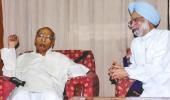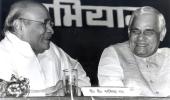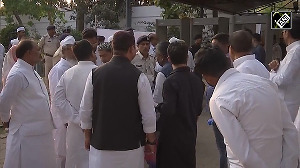It is thanks to the policy of liberalisation conceived by Manmohan Singh and enforced by P V Narasimha Rao that the Indian economy has now become the world's 5th largest economy by nominal GDP, asserts Dr Sudhir Bisht.

The NDA government has announced the Bharat Ratna for the late prime minister P V Narasimha Rao. While some may say that the reason for this may be largely political, rubbing it in on the Gandhi Parivar for denying Rao any sense of glory ever, I want to talk about the seminal contribution made by him in ushering in the liberalisation era in the country.
Had it not been for Narasimha Rao, India may have remained stuck in the licence raj era. He truly, truly deserves the highest award of India. In fact, he deserves it more than many of those who were bestowed this award, even though they did not make any worthwhile contribution to India.
Rao was an accidental prime minister much before his finance minister came to be known as one in 2004. He had almost retired from active politics when he was asked by the Congress to head the minority government in 1991 after Rajiv Gandhi's unfortunate assassination.
In fact, he had partly relocated to his home state of Andhra Pradesh, when the Congress party asked him to be the PM of a minority government. The man lasted one full term, the first minority government head to have achieved that feat.
The Rao government is often criticised for not doing enough to protect the Babri mosque that existed at Ayodhya at the place where a majestic Ram temple now stands. The Congress leadership has said that had there been a Nehru-Gandhi scion as the PM, he/she would have dismissed the Kalyan Singh government in Uttar Pradesh and ensured that the mosque was not demolished by the rampaging kar sevaks. This is a bizarre argument.
A democratically elected state government could have been dismissed only if there was a complete law and order breakdown in the state. Before the mosque was demolished by the overzealous kar sevaks, the law-and-order situation had not really broken down.
The then chief minister of Uttar Pradesh, Kalyan Singh, had repeatedly assured the Union government that he would not allow the mosque to be vandalised. How could Rao have dismissed the UP government before the actual events took place?
Kalyan Singh resigned soon after the mosque demolition.
Rao was also tainted in a vote for cash scandal in 1993. It was alleged that his loyalists bribed four Jharkhand Mukti Morcha MPs in July 1993 to bail out his government during a no-confidence motion. This is one allegation that would always blemish his legacy as a PM.

However, there are many things that Rao did for which he has received so little credit in his lifetime and beyond.
Rao should get the maximum credit for ushering in true liberalisation in India during his tenure. That credit is often given to Dr Manmohan Singh who was the finance minister in the Rao government. While it is true that Dr Singh, a venerated economist, played a key role in the process of liberalisation, the real credit must go to Narasimha Rao for backing his FM to the hilt.
I will describe in greater detail the magnitude of challenges that Rao faced within his own party as he embarked upon the path of economic glasnost (openness) and perestroika (restructuring) of India's economic framework that was riddled with permit raj.
The economic factors like interest rates, inflation, taxes, exchange rates, recession and depression are some of the factors that impact the overall economic ecosystem of the country. Add to this list the role of government's economic policies and the country's stability perception and you get an overall picture of how attractive a country can be for businesses to be able to invest in the country.
When the economic environment of the country is not positive, there are very little chances for that country to attract foreign investment.
In January 1991, India had to pledge 67 tonnes of gold to the International Monetary Fund as India's foreign exchange reserves had dipped to $1.2 billion. Till about 1990, Indian economic policies were stalled in socialistic moorings. The buzzwords then were 'import substitution', 'licence-permit raj', 'public sector monopoly'.
The successful implementation of economic liberalisation, started in 1991 by the then finance minister Dr Manmohan Singh and supported to the hilt by the then prime minister, P V Narasimha Rao, was nothing short of a miracle, to say the least.
The basic principle of the policy was to do away with protectionism and end the monopoly of public sector undertakings and selected private conglomerates in India. The new economic policy of 1991 aimed at liberalising trade and commerce. Its objective was to allow multinationals companies to enter Indian market easily.
Dr Singh and Rao wanted to privatise the loss-making and inefficient public sector undertakings. Another key area where the reforms struck was in reducing fertiliser subsidies.
In short, the buzz words were reducing flab from PSUs and encouraging MNCs to come and invest in India.

Today, it is an acknowledged fact that the policy of liberalisation over several decades had led to incredible surge in India's economic growth. The fact that we all seem to miss is that initiating these reforms was not exactly a cakewalk for the Rao government.
That new policy was opposed by many politicians within the Congress party. It is also true that many ministers in the Rao government opposed the new policy stealthily. A few also opposed the revolutionary policies openly. It is here that Rao outwitted many such opponents by his patience.
An article, 'IB gave Narasimha Rao list of Congmen and ministers against 1991 reforms' written by his biographer Vinay Sitapati in the Indian Express on June 25, 2016, gives insight into the way the most unsung prime minister of India backed his finance minister to make the rollout of liberalisation a success in his five-year tenure.
According to Sitapati, the Intelligence Bureau report suggested that as many as 55 Congress MPs, including cabinet ministers like Balram Jhakar and Madhavrao Scindia, were opposed to liberalisation of trade policies.
There were industrialists like K K Birla, a member of Parliament, who were opposed to the entry of multinationals in the Indian market.
Many MPs opposed the removal/reduction of farm subsidies and many, including Arjun Singh, the then human resource development minister, and Digvijaya Singh, MP, were not happy that Rao was able to strike a tacit understanding with the principal Opposition party, the Bharatiya Janata Party, on economic reforms.

Rao was not the one to give up in frustration. He continued to push the process of reforms. He would personally meet the stalwarts who were opposed to them and tried to win them over.
He cleverly camouflaged some of the reforms as an extension of 'Nehruvian socialism' and this struck the right chord with some of the more reasonable Congressmen. He engaged with Opposition leaders by sending envoys to them who could sell the constructive aspects of reforms even to the most belligerent opponents.
It may be mentioned here that the deep-rooted, flourishing, Indian business houses felt endangered by the process of reforms. These industrialists were safely ensconced on their home turf with very little competition within India. Working with old and fully depreciated machinery, they were raking profits from whatever their factories produced.
There existed waiting lists for the purchase of Bajaj scooters and Fiat cars at that time.
I remember that I bought my Bajaj Super scooter while I was posted at Allahabad in 1990. I waited for over five months before I was asked by the dealer to come and take the delivery of my scooter.
Upon reaching the dealer's showroom I was disappointed to find out that the scooter being given to me was not of the colour that I wanted. But I had to buy whatever was available and for the next three years, I rode on my light blue coloured scooter even though I hated the colour!
Indian businessmen got together and formed what is popularly called as the Bombay Club. In 1993, eight prominent businessmen -- Rahul Bajaj, Jamshed Godrej, Arun Bharat Ram, L M Thapar, C K Birla, Hari Shankar Singhania, B K Modi and M V Arunachalam -- gave a signed petition to Dr Manmohan Singh and demanded a 'level playing field'. This, they said, was needed to be able to compete with foreign business players.
The Rao-Singh duo exhibited great patience in wearing out these businessmen. They granted a few concessions to soothe their frayed nerves. One such concession was to allow Indian businesses to raise preference shares up to 25 percent of their authorised share capital to get funds, without diluting control over their enterprises as these shares didn't have voting rights.
In respect of existing joint venture companies -- between a foreign and an Indian partner --the government insisted on the foreign partner getting a 'no objection certificate' from the local partner, if it wanted to establish a 100% establishment of its own.

Dr Singh and his boss Rao were able to push through the process of reforms without any attendant bloodbath. It is important to mention here that the PM was heading a minority government and many stalwarts within his own party were avowed socialists.
It is thanks to the policy of liberalisation conceived by Manmohan Singh and enforced by P V Narasimha that the Indian economy has now become the world's 5th largest economy by nominal GDP.
According to many students of the history of the Indian economy, India had the largest and most advanced economy between the 1st century and 18th century. Though we are still far, far away from coming anywhere near the top two economies of the world in terms of nominal GDP, we are on our way to becoming the third largest economy in the next few years.
India has a lot to thank P V Narasimha Rao and Dr Manmohan Singh for their vision and ability to drive reforms in a hostile environment of protectionism.
Dr Sudhir Bisht, author and columnist, writes from New Delhi.











 © 2025
© 2025